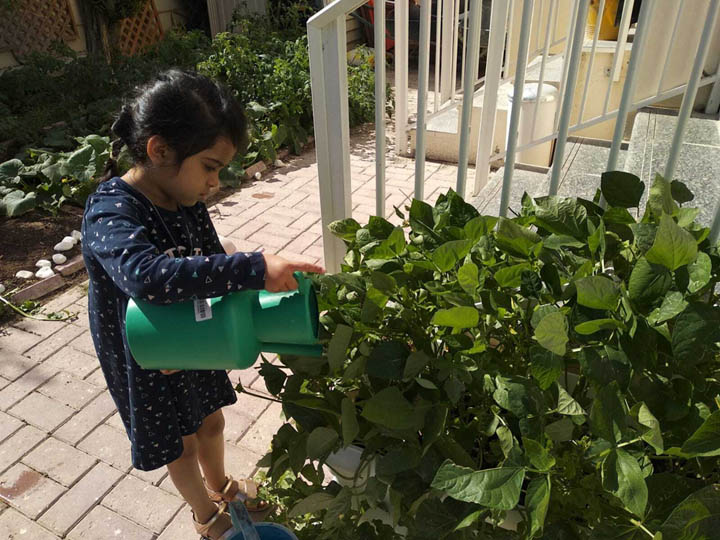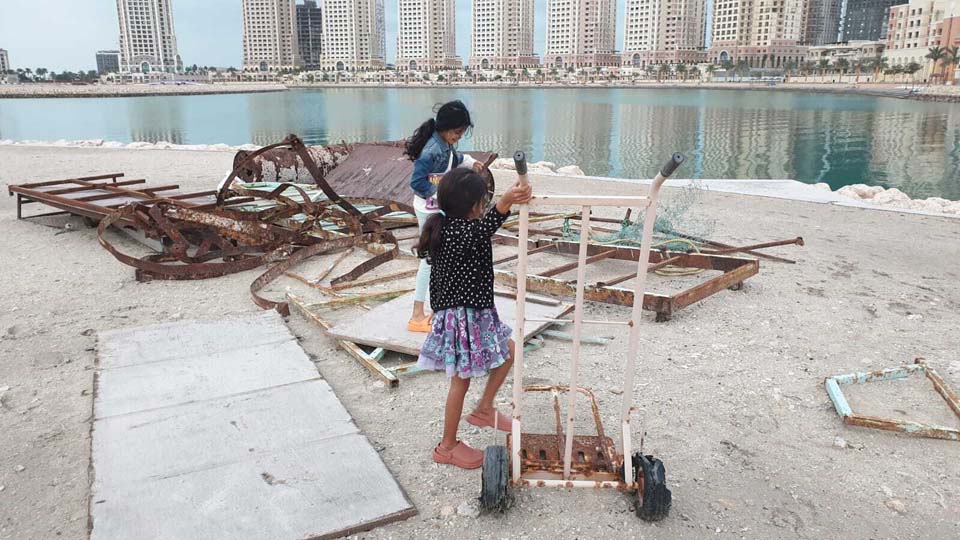It can be extremely challenging as a family to go from living in a place where sustainability is ingrained in daily life to uprooting to a completely different environment. It requires strong commitment and responsibility from at least one adult to consistently lead and guide the family regardless of the changing circumstances.
A move abroad can lead to adapting to a new lifestyle and forgetting how we used to live. Although being adaptable is an essential skill, it should not lead us to discard our core values. For our family, sustainability is one of them.
A new home and environment need to be viewed from a fresh perspective. So, when it comes to sustainability, you might need to focus on implementing smaller solutions while adjusting to your new surroundings. Here’s how our family did it when we moved to Qatar.
Simple Living
Before moving to Qatar, we, as British-Indians, had been life-long UK residents. There, sustainability was an integral part of our lives and those of our community.
In a typical kitchen, you would see an uneven line-up of reused glass jars storing lentils, pulses, and spices. Family members also consistently passed on children’s clothes. Children would also play with items available in the home, like tins and cotton reels. They were also encouraged to play outdoors, in rain or shine.
Our recycling and wastage system was also very advanced. For nearly two decades now, local councils in England have supplied every household with a compost bin and three separate bins for recyclables, garden waste, and general waste (for landfill). It is also common to find recycling bins close to public spaces. Additionally, supermarkets tax single-use plastic bags while promoting biodegradable or reusable carrier bags.

Sustainable solutions go a while back in the UK. Decades ago, a fridge would contain glass bottles of fresh milk delivered daily by the local milkman. As you would only be able to obtain what you needed, wastage was minimal.
Like many households, we also had our own garden where we would plant and grow all year round with our children. We also habitually repurposed kitchen items for cleaning and medical purposes. For instance, we used lemon juice as a kitchen sink cleaner and gargled warm salt water to treat sore throats. These solutions helped us reduce our packaging use, and we considered them to be healthier for our bodies and home environment. Implementing the three Rs—reduce, reuse, and recycle—was almost second nature.
Adapting But Remaining Rooted
When we arrived in Doha in 2017, my initial reaction was, “how much plastic?!”. My workplace offered an endless supply of plastic water bottles to staff and visitors, and supermarkets gave several carrier bags for a handful of items. The recycling system was also limited compared to what we were used to.
We immediately noticed that the Doha lifestyle provided many of its residents and citizens with a convenient and minimally stress-free life, which is wonderful in many ways. However, convenience can negatively affect the environment if we are not mindful.
So, we took matters into our own hands. We located our nearest recycling point and set up a waste organising system within our home. We took our own bags to the supermarket and attended the local farmers’ market to buy fruits and vegetables. We also carried our own water bottles for refilling and refrained from buying plastic bottles or at least tried to avoid using them whenever possible.
Additionally, we taught our children to pick up any rubbish they saw and place it in the nearest bin or, better still, take it away for recycling. We also limited our household water use and reserved unused water for our plants.
Moreover, our family time consisted of nature walks to engage our children with the environment, watching earth-related documentaries, and reading nature-themed books. We hoped that exposing them to as much eco-conscious material as possible and linking them to our daily activities would help them become environmentally aware.

These were the steps we took to ensure that our core values stayed as intact as possible during our settling period.
National Drive
Since then, Qatar has come a long way. The development of sustainable cities like Lusail and Msheireb, green transport initiatives, and a large-scale solar power plant, plus the green movements cropping up throughout the country, are all examples of that. Hopefully, there is more to come, with environmental development being one of the Qatar National Vision 2030 pillars. It has been very exciting to see something vital to us represented as a national goal.
Our Professional Lives
As parents, my husband and I take the task of educating and ingraining sustainability in our children very seriously. After all, we are equipping them with tools to serve themselves and their future communities.
The same is true when it comes to our roles as nursery founders. For this reason, we have pledged to run our nursery sustainably by recycling, reusing, composting, growing fruits/vegetables, and planting trees.
As individuals who are passionate about sustainability and early years development, it gives us great delight to combine the two and apply our ethos and practices on a larger scale. We hope that this will lead us to have a more significant positive impact on our communities and the world.
What You Can Do
There are many actions households in Qatar can take to live more sustainably. For starters, as frequently moving home is common in Qatar, consider reusing boxes and donating them to the next person. Boxes are also great alternatives to plastic containers to store kitchen and household items and toys. Once you are completely done with them, take them to one of the many recycling collection points around.
It’s a common misconception that you cannot grow plants without a garden. The truth is, you only need a small balcony or window with good sunlight to grow herbs or vegetables. So, find your green thumb and give it a go!
Another step you can take is attaching a water filter to your kitchen tap for drinking water. This reduces waste and saves money in the long run because bottled water—whether from individual bottles or large dispenser ones—impacts the environment because of the processing and transporting it requires.
There are also many environmentally-friendly ways to keep your children entertained. You can encourage them to write and draw on scrap paper, which can be used to origami or create paper aeroplanes. They can also do other activities with household materials like making coloured rice and coloured water in glasses or constructing vehicles and houses out of boxes and decorating them. Better still, take them outdoors—it’s nature’s playground!
Sustainability can also include helping others, so pay it forward by donating clothes and any items you no longer need. You can turn this into a fun opportunity to bond with your family while planting a seed in your little ones that will inspire them to do the same in the future.
All in all, sustainability is not just something one does—it’s a way of life that we can all adopt.
Family Eco Tips for Qatar Newbies
- Encourage your children to recycle by having separate boxes for paper, plastic, and glass.
- Produce your own compost.
- If you need a hand, visit gardening workshops. Hadiqaa, a local gardening organisation, offers courses and online resources.
- Get your children involved with planting and growing vegetables.
- Take them to visit the Al Meera recycling robot. You get loyalty points for every item you feed him!
- Enjoy children’s gardening activities at Torba Store/Market or Maktaba Children’s Library, where they also have daily activities.
- Take regular family visits outside Doha to Purple Island, Zekreet, Heenat Salma farm, and other nature-rich places.
- Join beach clean-ups.
- Share and start a swap rotation of books with friends instead of buying new ones. You can even join a library (our family favourite is Maktaba!).
- Stay up-to-date by joining Facebook groups, especially ones for your local area.



